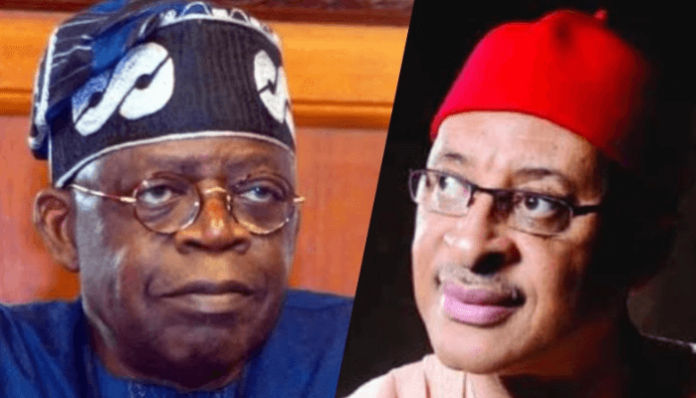
Pat Utomi, professor of political economy, has announced the formation of a shadow government under the Big Tent Coalition Shadow Government, unveiled virtually on Monday, May 5. The initiative is designed to serve as a structured opposition to President Bola Tinubu’s administration.
A shadow government, typically found in parliamentary systems, mirrors the structure of the actual government, offering scrutiny, policy alternatives, and a platform for the opposition. Utomi described this version as a “national emergency response” to the Tinubu administration’s policies and governance.
According to Utomi, the group includes members from various opposition parties and aims to critically examine government actions, highlight policy shortcomings, and offer alternative approaches across key sectors such as the economy, education, healthcare, infrastructure, law and order, and constitutional reform.
“The recent spate of defections to the All Progressives Congress provides further evidence that all is not well with democracy in Nigeria,” Utomi said. He emphasized the need for a credible opposition to spotlight governance failures and reshape national discourse.
He also criticised the government’s handling of the petroleum subsidy removal, accusing it of masking poor planning under the guise of political consensus.
“This shadow team must also address issues of ethics, transparency, and integrity, which continue to challenge this government at every turn,” he added. The shadow cabinet will reportedly meet weekly to review public policy and suggest reforms.
Prominent members of the shadow government include Dele Farotimi, a human rights advocate, who will lead the Ombudsman and Good Governance portfolio. Others in the policy delivery unit are Oghene Momoh, Cheta Nwanze, Daniel Ikuonobe, Halima Ahmed, David Okonkwo, and Obi Ajuga. Additional members include Adefolusade Adebayo, Peter Agadah, Sadiq Gombe, Chibuzor Nwachukwu, Salvation Alibor, Bilkisu Magoro, Victor Tubo, Charles Odibo, Otive Igbuzor, Eunice Atuejide, Gbenga Ajayi, Mani Ahmad, Peter Oyewole, and Omano Edigheji.
Further members named are Sidi Ali, Ibrahim Abdukarim, Adenike Oriola, Promise Adewusi, Ukachukwu Awuzie, Ambrose Obimma, Rwang Pam, Dr Kingsley Anedo, Auwal Aliyu, Ghazali Ado, Nana Kazaure, Aisha Yusuf, Dr Charles Gilbert, and Olujimi Akiboh.
Reacting to the development, Mohammed Idris, Minister of Information and National Orientation, described the initiative as inappropriate within Nigeria’s federal structure. “At a time when our nation is set to celebrate 26 unbroken years of presidential democracy, the idea of a so-called ‘shadow government’ is an aberration,” he said.
“Nigeria is not a parliamentary system where such a system is practised, and there is no provision for such in our statute books. While opposition politics is a central feature of democracy, it must be practised at all times within the bounds of propriety. This idea of a shadow government sadly does not pass that test. Our bicameral legislature amply features members of the opposition, and it should be the right place to contest meaningful ideas for nation-building.”



